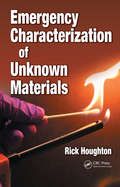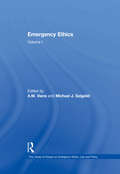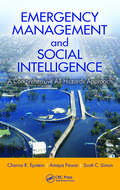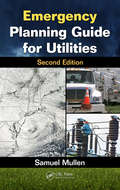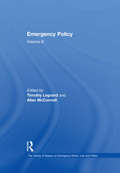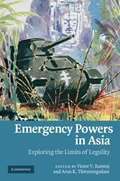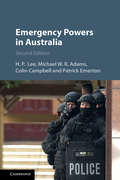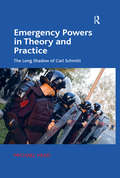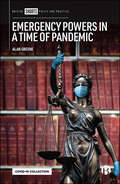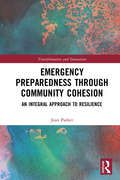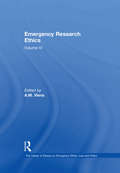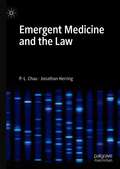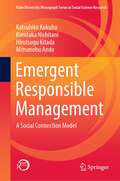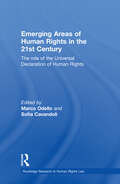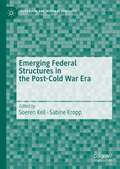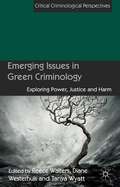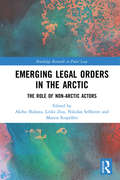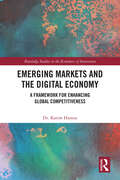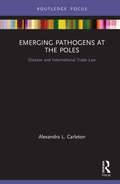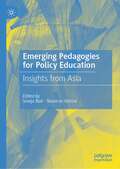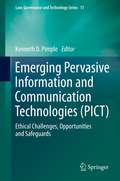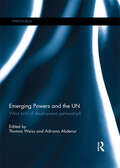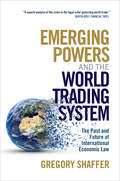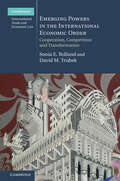- Table View
- List View
Emergency Characterization of Unknown Materials
by Rick HoughtonDeliberately, accidentally, or consequentially, first responders and waste site workers handle unknown substances of varying degrees of danger every day. Unidentified chemicals involved with clandestine production of WMD agents or drugs, explosive materials, unlabeled waste, and forensic samples all pose a threat to the worker and those they prote
Emergency Ethics: Volume I (The Library of Essays on Emergency Ethics, Law and Policy)
by Michael J. SelgelidEmergencies are extreme events which threaten to cause massive disruption to society and negatively affect the physical and psychological well-being of its members. They raise important practical and theoretical questions about how we should treat each other in times of ’crisis’. The articles selected for this volume focus on the nature and significance of emergencies; ethical issues in emergency public policy and law; war, terrorism and supreme emergencies; and public health and humanitarian emergencies. Together they demonstrate the normative implications of emergencies and provide multi-disciplinary perspectives on the ethics of emergency response.
Emergency Management and Social Intelligence: A Comprehensive All-Hazards Approach
by Charna R. Epstein Ameya Pawar Scott. C. SimonFor effective preparedness, emergency managers must comprehend how a disaster impacts not only the physical infrastructure of the affected community but also the population. They must understand how the people interact with one another, how they interact with government, and how they react to the disaster event. In other words, they must have socia
Emergency Planning Guide for Utilities
by Jérôme Pagès Samuel Mullen Francois LeAn increase in major natural disasters has led to heightened concerns about utility operations and public safety. Due to today's complex, compliance-based environment, utility managers and planners often find it difficult to plan for the action needed to help ensure organization-wide resilience and meet consumer expectations during these incidents. This volume offers a working guide that presents new and field-tested approaches to plan development, training, exercising, and emergency program management. The book will help utility planners, trainers, and responders to more effectively prepare for damaging events and improve the level of the utility‘s resilience.
Emergency Policy: Volume III (The Library of Essays on Emergency Ethics, Law and Policy)
by Allan McConnellThis volume of leading scholarly articles addresses the international dynamics of emergency policy and practice. In a world of increasing technological, economic and political interdependency, it is no longer feasible for states to ignore the pervasive influence of globalisation. The crises wrought by industrial disasters, catastrophic weather events, pandemics, financial implosion and cyber intrusion now transcend and challenge national interests with increasing frequency. The case-studies collected here explore these global dimensions of crisis and the state through the lenses of planning and prevention, acute responses, recovery and reconstruction, and learning about crisis. This collection is essential reading for academics, policy officials and practitioners with an interest in emergency management, risk management and issues of national/global security. In original introductory and concluding chapters to the volume, Legrand and McConnell provide a critical perspective on the challenges that globalisation presents to policymakers under crisis conditions and signposts some of the emerging challenges to the state and international community.
Emergency Powers in Asia: Exploring the Limits of Legality
by Victor V. Ramraj Arun K. ThiruvengadamWhat is the relevance of contemporary debates over emergency powers for countries situated in Asia? What role does, and should, the constitution play in constraining these powers? The essays in this collection address these issues, drawing on emergency situations in over 20 countries in Asia as a ready-made laboratory for exploring the relationship between emergency powers and constitutionalism. This volume therefore rests squarely at the intersection of two debates - a debate over the ability of law to constrain the invocation and use of emergency powers by the executive in times of crisis, and a debate over the nature and viability of constitutionalism in Asia. At this intersection are fundamental questions about constitutionalism and the nature of the modern state, questions that invite legal, political, sociological and historical analysis.
Emergency Powers in Australia
by Colin Campbell H. P. Lee Michael W. Adams Patrick EmertonDemocratic countries, such as Australia, face the dilemma of preserving public and national security without sacrificing fundamental freedoms. In the context where the rule of law is an underlying assumption of the constitutional framework, Emergency Powers in Australia provides a succinct analysis of the sorts of emergency which have been experienced in Australia and an evaluation of the legal weapons available to the authorities to cope with these emergencies. It analyses the scope of the defence power to determine the constitutionality of federal legislation to deal with wartime crises and the 'war' on terrorism, the extent of the executive power and its relationship to the prerogative, the deployment of the defence forces in aid of the civil power, the statutory frameworks regulating the responses to civil unrest, and natural disasters. The role of the courts when faced with challenges to the invocation of emergency powers is explained and analysed.
Emergency Powers in Theory and Practice: The Long Shadow of Carl Schmitt
by Michael HeadWhy have the early years of the 21st century seen increasing use of emergency-type powers or claims of supra-legal executive authority, particularly by the Western countries regarded as the world's leading democracies, notably the United States? This book examines the extraordinary range of executive and prerogative powers, emergency legislation, martial law provisos and indemnities in countries with English-derived legal systems, primarily the UK, the US and Australia. The author challenges attempts by legal and academic theorists to relativise, rationalise, legitimise or propose supposedly safe limits for the use of emergency powers, especially since the September 2001 terrorist attacks. This volume also considers why the reputation of Carl Schmitt, the best-known champion of 'exceptional' dictatorial powers during the post-1919 Weimer Republic in Germany, and who later enthusiastically served and sanctified the Nazi dictatorship, is being rehabilitated, and examines why his totalitarian doctrines are thought to be of relevance to modern society. This diverse book will be of importance to politicians, the media, the legal profession, as well as academics and students of law, humanities and politics.
Emergency Powers in a Time of Pandemic
by Alan GreeneHow do we maintain core values and rights when governments impose restrictive measures on our lives? Declaring a state of emergency is the best way to protect public health in a pandemic but how do these powers differ from those for national security and economic crises? This book explores how human rights, democracy and the rule of law can be protected during a pandemic and how emergency powers can best be ended once it wanes. Written by an expert on constitutional law and human rights, this accessible book will shape how governments, opposition, courts and society as a whole view future pandemic emergency powers.
Emergency Preparedness through Community Cohesion: An Integral Approach to Resilience (Transformation and Innovation)
by Jean ParkerThis book is a revision of the author’s original doctoral thesis on emergency preparedness through community radio in North Indian villages into a widening array of possible reapplications in other community development fields. The author expands on the process of transforming emergency preparedness education through community media in rural North India and applies this to the development of community-prosperity, defined simply as human and planetary well-being, anywhere in the world. A new theoretical framework is presented which combines the pivotal Integral Worlds Approach developed by Lessem and Schieffer with Critical Theory, thus exploring a new way to envision and implement social change, leading to innovation and social transformation. This book introduces the term "constructive resilience," which is a type of community-building that occurs alongside dominant societal structures that are either oppressive or ineffective. An evolving field of study and practice, it is emerging from the work of academics and community-builders who are members of the Bahá’í Faith. Bahá’í "consultation," a process of inquiry and decision-making, is offered as a systematic and effective method of defining problems and enacting solutions and is examined in the context of emergency preparedness education and local capacity-building. With its integral development approach, its unique combination of themes and theoretical components, and integration with the Bahá’í Faith, as well as its interdisciplinary nature, this book will be invaluable reading for researchers in many fields. It will be of particular interest in university-based training programs in disaster management and the various disciplines of international community development, as well as practitioners in the areas of micro enterprise, disaster management, community development, rural communications, rural economics and emergency preparedness education.
Emergency Research Ethics: Volume IV (The Library of Essays on Emergency Ethics, Law and Policy)
by A. M. ViensThe essays selected for this volume focus on issues that arise when attempting to design, review and undertake research involving human participants who are experiencing a private or public emergency. The main themes discussed by the essays are: the distinctive and significant ethical questions as to how research participants can be treated during emergency settings; the ethical challenges raised by emergencies for researchers undertaking research and its effects on the nature of research pursued; and procedural obstacles raised by emergencies which can affect the quality of good research ethics review. The volume is unique in that it is the first collection to exclusively deal with all of the central ethical aspects of conducting human subject research in the context of emergency.
Emergent Medicine and the Law
by Jonathan Herring P.-L. ChauThis book examines the relationship between law and scientific advancement, with a particular focus on the theory of evolution and medical innovation. Historically, the law has struggled to keep pace with modern medical advances. The authors demonstrate that the laws that govern human behaviour must evolve in response to such advances. This book describes how evolution shapes us humans and allows us to understand processes from ageing to decision making, and examines recent medical developments related to reproduction, neurosciences, sexuality, illness, bodily autonomy, and death, while considering the ethical, philosophical and legal implications of those developments.
Emergent Responsible Management: A Social Connection Model (Kobe University Monograph Series in Social Science Research)
by Katsuhiko Kokubu Kimitaka Nishitani Hirotsugu Kitada Mitsunobu AndoThis book proposes emergent responsible management as a new tool to address the infinite nature of managerial responsibility and discusses how to bring out activities based on infinite responsibility in organizations. Whereas the concept of responsibility of corporations has been brought to the forefront with increasing recognition of the importance of corporate social responsibility (CSR), its essence has not been fully perceived, which has inevitably resulted in the restrictive feeling associated with organizational CSR activities. This book not only involves theoretical discussion by shedding light on the notions of ‘responsibility’ and ‘emergence’ underpinning the theory of emergent responsible management; it also provides practical insights with several case studies to examine how activities reflecting these fundamental elements have been practiced. In this way, the authors propose corresponding organizational design and process to encourage its continued practice. In addition, the effects of emergent responsible management and how it can be applied to new issues such as fulfilling sustainable development goals (SDGs) are also examined. The book is highly recommended for business practitioners as well as consultants who deal with CSR in everyday practice.
Emerging Areas of Human Rights in the 21st Century: The Role of the Universal Declaration of Human Rights (Routledge Research in Human Rights Law)
by Marco OdelloThis book includes a set of studies and reflections that have emerged since the adoption of the Universal Declaration of Human Rights in 1948. Encompassing a number of human rights, such as the right to environmental protection, the right to humanitarian aid, and the right to democratic governance, this collection focuses on issues and areas that were not originally mentioned or foreseen in the Declaration but that have since developed into salient topics. These developing rights are considered in the light of contemporary national and international law, as well as against the wider picture and the contexts in which human rights may have effect. Moreover, the topics covered take in a wide range of research fields, including law, politics and criminology. Emerging Areas of Human Rights in the 21st Century is aimed primarily at undergraduate and postgraduate students, and scholars interested in international law, human rights and politics.
Emerging Challenges in Privacy Law
by David Lindsay Normann Witzleb David Lindsay Moira Paterson Sharon Rodrick Normann Witzleb Moira PatersonThis collection of essays explores current developments in privacy law, including reform of data protection laws, privacy and the media, social control and surveillance, privacy and the Internet, and privacy and the courts. It places these developments into a broader international context, with a particular focus on the European Union, the United Kingdom, Australia and New Zealand. Adopting a comparative approach, it creates an important resource for understanding international trends in the reform of privacy and data protection laws across a variety of contexts. Written by internationally recognised experts, Emerging Challenges in Privacy Law: Comparative Perspectives provides an accessible introduction to contemporary legal and policy debates in privacy and data protection law. It is essential reading for academics, policy makers and practitioners interested in current challenges facing privacy and data protection law in Europe and in the common law world.
Emerging Federal Structures in the Post-Cold War Era (Federalism and Internal Conflicts)
by Soeren Keil Sabine KroppThis book conceives federalism not as a static institutional architecture, but as a dynamic formation always in flux. This may entail processes of federalization, but in some cases also lead to de-federalization. It looks at emerging federal structures worldwide and analyses federal structures: their emergence, operation and categorization. The contributors highlight that the “emergence” of these federal structures has multiple facets, from the recognition of ethnic diversity to the use of federalism as a tool of conflict resolution. Identifying and categorizing processes of federalization and defederalization in a variety of cases, the book provides much needed empirical and theoretical discussion on emerging federal structures and the changing nature of federalism in the post-Cold War era.
Emerging Issues in Green Criminology
by Tanya Wyatt Reece Walters Diane Solomon WesterhuisThis edited collection brings together internationally renowned scholars to explore green criminology through the interdisciplinary lenses of power, harm and justice. The chapters provide innovative case study analyses from around the world that seek to advance theoretical, policy and practice discourses about environmental harm.
Emerging Legal Orders in the Arctic: The Role of Non-Arctic Actors (Routledge Research in Polar Law)
by Nikolas Sellheim Akiho Shibata Leilei Zou Marzia ScopellitiMore than ever before the changing environmental and political landscape in the Arctic requires stability and foreseeability based on resilient common norms. The emerging legal orders in the Arctic cannot be legitimately created or effectively implemented unless all relevant actors are involved. Simultaneously, it must always be based on respect for the sovereign rights of the eight Arctic states in the region, as well as the tradition and cultural livelihood of the local communities. It is this delicate balance between Arctic and non-Arctic interests that is the core problématique for the emerging legal orders in the Arctic. Emerging Legal Orders in the Arctic critically examines the role of non-Arctic actors in this advancement of the shape and scope of the Arctic legal order. Discussing the admittance and participation of Observer states and organisations in the Arctic Council, including task force meetings where new treaties are negotiated, it details the issues and successes this can result in. Setting up the context of the current legal orders in the Arctic, the book discusses Asian, indigenous and European perspectives, amongst others. There is a strong focus on the groundbreaking fisheries agreement of November 2017 in the Central Arctic Ocean (CAO), and the impact on both Arctic and non-Arctic actors. Interests in marine living resources, scientific cooperation and the Arctic shipping regimes and governance are also thoroughly discussed from multiple perspectives. The book combines the expertise of academics and practitioners in the fields of international law and Arctic governance, uniquely focusing on Asian actors in the Arctic legal order-making. The resulting study is a fascinating insight into the interplay between non-Arctic actors and the Arctic legal order, and will be invaluable to academics in the field of Arctic and international law.
Emerging Markets and the Digital Economy: A Framework for Enhancing Global Competitiveness (Routledge Studies in the Economics of Innovation)
by Karim HamzaThis book provides a strategic blueprint for understanding how pioneering emerging markets are leveraging the digital economy to challenge global economic hierarchies. It explores the role of disruptive technologies like AI, 5G, and fintech in reshaping industries, markets, and economic structures.Designed for researchers, business leaders, policymakers, and strategists, this book delivers a comprehensive analysis of how countries such as China, India, South Korea, Saudi Arabia, the UAE, Turkey, Malaysia, Vietnam, Mexico, and Egypt are driving digital competitiveness. Through in-depth case studies and a data-driven approach, readers will gain valuable insights into the policies, investments, and innovations that have propelled these economies onto the global stage.By uncovering the strategies behind digital success, this playbook equips readers with the knowledge and tools to navigate the evolving global economy, seize emerging opportunities, and anticipate the next wave of digital disruption.
Emerging Pathogens at the Poles: Disease and International Trade Law (Routledge Research in Polar Law)
by Alexandra L. CarletonEmerging Pathogens at the Poles: Disease and International Trade Law explores the applicability and possible complicating issues of the SPS Protocol to the Polar Regions in light of emerging pathogeneses and unknown host and environmental susceptibility and resilience. It examines the current literature on emerging pathogeneses in the Arctic and Antarctic and the relationship pathogeneses has with human development and movement of goods and people in spreading pathogens in the Polar Regions. Given the endemic nature of the Polar environment and the increasing interest in these regions for tourism and industry, this topic is important to address. The major component of the work is on the relevance of the SPS Protocol and the GATT 1994 Article XX(b) exception on human, animal and plant health as a barrier to trade which is examined in the context of its application to the Arctic and Antarctic. This book is an introduction to the interdisciplinary thinking required, across both science and law, in order to appreciate the significance of global trade barriers in reducing disease transmission and spread. The spread of pathogens across boundaries has become an important geopolitical issue and the provisions of international trade law may prove decisive in limiting or exacerbating the spread of disease. Academics and students with initial knowledge of the international trade regime, or those with initial studies in health or Polar medicine, will find this cross-over a useful introduction to the complications of food, trade and disease.
Emerging Pedagogies for Policy Education: Insights from Asia
by Sreeja Nair Navarun VarmaThis edited book captures key trends that are driving changes in policy education and presents a repertoire of pedagogies to prepare educators and policy programme designers to teach for better impact in learning and policy practice. Supported with observations from selected Asian universities the chapters cover the experiences of authors in working with students at undergraduate and postgraduate levels, as well as professional programmes such as executive education, training, and capacity building for mid-career professionals and practitioners. Part I of this book presents ideas that are asserting the need for incorporation of new content as well as teaching practices for policy education. Part II covers selected cases of application of pedagogical approaches and strategies in Asian universities, tested at different education levels, modes of teaching, and disciplines.
Emerging Pervasive Information and Communication Technologies (PICT): Ethical Challenges, Opportunities and Safeguards
by Kenneth D. PimpleThis book provides a wide and deep perspective on the ethical issues raised by pervasive information and communication technology (PICT) - small, powerful, and often inexpensive Internet-connected computing devices and systems. It describes complex and unfamiliar technologies and their implications, including the transformative potential of augmented reality, the power of location-linked information, and the uses of "big data," and explains potential threats, including privacy invaded, security violated, and independence compromised, often through widespread and lucrative manipulation. PICT is changing how we live, providing entertainment, useful tools, and life-saving systems. But the very smartphones that connect us to each other and to unlimited knowledge also provide a stream of data to systems that can be used for targeted advertising or police surveillance. Paradoxically, PICT expands our personal horizons while weaving a web that may ensnare whole communities. Chapters describe particular cases of PICT gone wrong, but also highlight its general utility. Every chapter includes ethical analysis and guidance, both specific and general. Topics are as focused as the Stuxnet worm and as broad as the innumerable ways new technologies are transforming medical care. Written for a broad audience and suitable for classes in emerging technologies, the book is an example of anticipatory ethics - "ethical analysis aimed at influencing the development of new technologies" (Deborah Johnson 2010). The growth of PICT is outpacing the development of regulations and laws to protect individuals, organizations, and nations from unintended harm and malicious havoc. This book alerts users to some of the hazards of PICT; encourages designers, developers, and merchants of PICT to take seriously their ethical responsibilities - if only to "do no harm" - before their products go public; and introduces citizens and policy makers to challenges and opportunities that must not be ignored.
Emerging Powers and the UN: What Kind of Development Partnership? (ISSN)
by Thomas G. Weiss and Adriana Erthal AbdenurThe post-2015 goals and the changing environment of development cooperation will demand a renewed and strengthened UN development system. In line with their increasing significance as economic powers, a growing number of emerging nations will play an expanded role in the UN development system. These roles will take the form of growing financial contributions to individual organizations, greater weight in governance structures, higher staff representation, a stronger voice in development deliberations, and a greater overall influence on the UN development agenda. Emerging Powers and the UN explores in depth the relationship of these countries with, and their role in, the future UN development system. Formally, the relationship is through representation as member states (first UN) and UN staff (second UN). However, the importance of the non-public sector interests (third UN) of emerging economies is also growing, through private sponsorship and NGO activities in development. This book was originally published as a special issue of Third World Quarterly.
Emerging Powers and the World Trading System: The Past and Future of International Economic Law
by Gregory ShafferVictorious after World War II and the Cold War, the United States and its allies largely wrote the rules for international trade and investment. Yet, by 2020, it was the United States that became the great disrupter – disenchanted with the rules' constraints. Paradoxically, China, India, Brazil, and other emerging economies became stakeholders in and, at times, defenders of economic globalization and the rules regulating it. Emerging Powers and the World Trading System explains how this came to be and addresses the micropolitics of trade law – what has been developing under the surface of the business of trade through the practice of law, which has broad macro implications. This book provides a necessary complement to political and economic accounts for understanding why, at a time of hegemonic transition where economic security and geopolitics assume greater roles, the United States challenged, and emerging powers became defenders, of the legal order that the United States created.
Emerging Powers in the International Economic Order: Cooperation, Competition and Transformation (Cambridge International Trade and Economic Law)
by David M. Trubek Sonia E. RollandThe post-war liberal economic order seems to be crumbling, placing the world at an inflection point. China has emerged as a major force, and other emerging economies seek to play a role in shaping world trade and investment law. Might they band together to mount a wholesale challenge to current rules and institutions? Emerging Powers in the International Economic Order argues that resistance from the Global South and the creation of China-led alternative spaces will have some impact, but no robust alternative vision will emerge. Significant legal innovations from the South depart from the mainstream neoliberal model, but these countries are driven by pragmatism and strategic self-interest and not a common ideological orientation, nor do they intend to fully dismantle the current ordering. In this book, Sonia E. Rolland and David M. Trubek predict a more pluralistic world, which is neither the continued hegemony of neoliberalism nor a full blown alternative to it.
